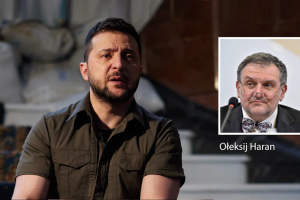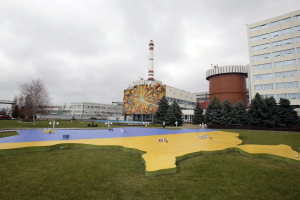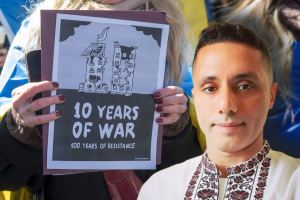Western Expectations and Fears Regarding Ukraine’s Parliamentary Elections
Aemin Becker,
Аnalyst,
Student of International Security at Sciences Po in Paris (France),
Intern at Ilko Kucheriv Democratic Initiatives Foundation
On July 21st, 2019, Ukraine will have snap parliamentary elections called for by new president Volodymyr Zelensky. The official reason for this move was the lack of a ruling coalition within Parliament; the likely actual reason is to ride the wave from Zelensky’s successful election and elect a Parliament more favorable to Zelensky’s policies.
Zelensky also wants to create a parliament that consists of new people, believing that this may increase Ukrainians’ trust in the government and belief that the resulting Parliament will work with the new president to actually foster change within the country. Polling shows that Zelensky’s party, Servant of the People, is likely to win up to 50% on party slates (though Ukraine’s electoral system is a mixed one, and it is not clear what the result in single-mandate constituencies will be). Furthermore, it appears as though Ukraine’s Western partners are generally supportive of Zelensky and his moves to craft a new Parliament more favorable to him.
With state elections comes invitations to observe the process and ensure its overall legitimacy. Observers monitor the elections by ensuring compliance with international standards as well as domestic laws. They also document any problems or trends that they see which interfere with the overall democratic process and would therefore take away from the election’s overall legitimacy.
Ukraine typically invites outside parties to observe the elections. This remains true for the 2019 snap elections, but Ukraine withdrew its invitation to monitors from the Parliamentary Assembly of the Council of Europe (PACE) in the wake of the reinstatement of Russia’s voting rights in PACE. Regardless, there will still be a lot of other international representatives, including from the Organization for Security and Cooperation in Europe.
Being able to observe the electoral process gives Western partners confidence in the process as well as ensures progress in the overall goal of fostering democracy within the country. It also increases the confidence of Ukrainians in their own electoral process – important for ensuring that Ukrainians trust the resulting government more.
Outside observation shows that the West is invested in ensuring Ukraine’s elections are democratic, but what do Western partners actually hope to see from the elections? What do they fear?
The European Union (EU) wants Kyiv to improve in terms of democratic improvements and other reforms. They would like to see a parliament that focuses on fostering democracy as well as brings about actual change within the country. The EU is trusting in Zelensky’s promise to not be like his predecessors, who promised change but did not deliver it to the extent that they – as well as individuals and other organizations operating both within and outside of Ukraine – desired.
Others hope that Ukraine works on fostering the rule of law, anticorruption mechanisms, improving the involvement of civil society, and ensuring freedom of expression (especially a safe environment for media and fostering adequate support for public broadcasting).
Civil society has historically faced a lot of repression and threats. It played an enormous role in the Euromaidan revolution and in the reform process since 2014. Western partners hope that the new parliament will work to not only protect civil society but also to foster civil society participation in the life of the country, especially in pressuring and monitoring the economic and judicial reforms promised during Euromaidan.
Regarding the media and freedom of expression, it is widely known that pluralism exists in Ukrainian media and it is easy to criticize authorities on every TV channel. However, many media sources are controlled by oligarchs. A key reform would be to eliminate the influence of oligarchs over the media, further protecting freedom of expression by doing so. Journalists within Ukraine also face a lot of violence (as noted in Freedom House’s rating for free and independent media in the 2019 report). This results partially from the tense situation and destabilization created by Russian aggression and their so-called “hybrid war” against Ukraine. Therefore, it is the hope of the West that the new parliament would also work to protect journalists as well.
One fear the West holds about the parliamentary elections is the extent of Russian influence within them. Russia’s interest in the elections is easily explained, given that they annexed Crimea and are actively involved in the Donbas conflict. Forming a pro-Russian parliament aids in Russia’s foreign policy goals within Ukraine.
However, this goal is not realistic. There are profound geopolitical changes in Ukrainian public opinion since 2014. According to a poll from June 2019, 61% of Ukrainians choose joining the EU versus 8% joining the Russia-led Eurasian Economic Union. 50% of respondents choose NATO versus 25% who are in favor of non-bloc status. It is true that at last check, the pro-Russian “Opposition Party – For Life” is currently polling second, but with only around 10-13%. It is not likely to be a part of the ruling coalition, but it will be quite vocal and may play a role in participating in “situational” majorities when voting on specific issues.
A specific concern regarding Russian influence pertains to the interference of cyber media within the elections. As stated by Lloyd Axworthy, head of the Canadian election monitoring mission in Ukraine, this issue is of particular concern “because the Russians are masters of it and the Ukrainians have had to put up with it for probably more than any other country in the world”.
Another concern (though not in security sphere) is that women are not participating equally in the electoral process. The UN country team in Ukraine cited the importance of equal women’s participation in the election and female representation in the next Verkhovna Rada, also stating that women have only been marginally represented in the government and have never been president. The last point is not fully justified, as there have been many women in ministerial offices, including the former prime minister Yulia Tymoshenko (who was also a serious contender for the presidency in three recent campaigns and now is planning to become a part of the ruling coalition). In the present parliament, women took the positions of first deputy speaker and vice speaker.
Nevertheless, international observers are right to remind Ukraine of their commitments under the Convention on the Elimination of All Forms of Discrimination Against Women, particularly Article 4 regarding quotas for female candidates in electoral lists and Article 7 regarding the elimination of discrimination against women in the political and public life of a country.
At last count, only 11.6% of deputies in parliament were women, which is less than the global average for women in parliament (24.3%) and below the European average of 28.5%.
Overall, the West is hoping for many improvements in the democratic functioning of Ukraine following the next parliamentary election, hence their concerns regarding the creation of a stable, pro-reform majority in the parliament, civil society involvement, freedom of expression, countering the Russian influence, and the low participation of women as candidates in the election. It remains to be seen whether the new Parliament, once elected, will follow through on these calls for reforms, but it’s safe to say that Ukraine will have the attention of the world on July 21st as voters head to the polls to decide what the future of their country will look like.
______________________________
This weekly analytical review was prepared by the Ilko Kucheriv Democratic Initiatives Foundation as a part of its ‘National Exit Poll 2019’ project implemented under the USAID/ENGAGE program, which is funded by the United States Agency for International Development (USAID) and implemented by Pact in Ukraine; Delegation of the European Union to Ukraine; International Renaissance Foundation; Embassy of Canada in Ukraine.








